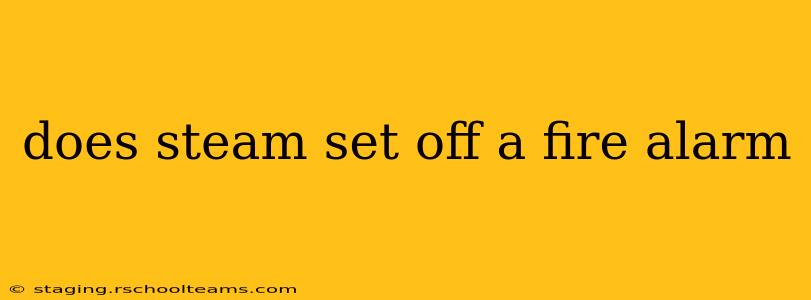Does Steam Set Off a Fire Alarm? Understanding the Science Behind False Alarms
Steam, while seemingly harmless, can indeed trigger a fire alarm under certain circumstances. This isn't because steam is inherently flammable, but rather due to its interaction with smoke detectors and the way these detectors work. Let's delve into the specifics to understand why this happens and what you can do to prevent false alarms.
How Do Smoke Detectors Work?
To understand why steam might set off a fire alarm, it's crucial to understand how smoke detectors operate. Most modern homes use ionization or photoelectric smoke detectors.
-
Ionization smoke detectors: These detectors use a small amount of radioactive material to ionize the air between two electrodes. Smoke particles disrupt this ionization, causing a change in the electrical current that triggers the alarm. They are generally more sensitive to fast-flaming fires, like those caused by grease or paper.
-
Photoelectric smoke detectors: These detectors use a light beam and a sensor. Smoke particles entering the chamber scatter the light, triggering the sensor and activating the alarm. They are generally more sensitive to slow-burning, smoldering fires, which produce larger smoke particles.
Both types of detectors can be sensitive to particles other than smoke, including those generated by steam under specific conditions.
Why Does Steam Sometimes Trigger a Fire Alarm?
Steam, when released in a large volume or in a confined space, can create a cloud of tiny water droplets. These droplets can temporarily disrupt the ionization chamber in an ionization detector, or scatter light in a photoelectric detector, mimicking the presence of smoke and leading to a false alarm. The effect is more pronounced when the steam is particularly dense or humid, creating a greater concentration of water droplets.
This isn't a guaranteed outcome. A small amount of steam from a kettle or shower is unlikely to cause problems. However, a significant release of steam, such as from a burst pipe or malfunctioning appliance, is more prone to triggering a sensitive detector.
What Types of Steam Are Most Likely to Set Off a Fire Alarm?
The likelihood of steam setting off a fire alarm increases with:
- Density of the steam: A concentrated cloud of steam is more likely to cause a false alarm than a diffused plume.
- Humidity levels: High humidity levels can exacerbate the problem by adding to the concentration of water particles in the air.
- Type of smoke detector: Ionization detectors are generally more prone to false alarms from steam than photoelectric detectors.
How Can I Prevent Steam From Setting Off My Fire Alarm?
While you can't entirely eliminate the possibility of a steam-induced false alarm, there are steps you can take to reduce the risk:
- Ensure adequate ventilation: Good ventilation can help disperse steam quickly, minimizing its impact on smoke detectors.
- Maintain your appliances: Regularly inspect and maintain appliances that produce steam to prevent leaks or malfunctions.
- Consider the location of your smoke detectors: If you have frequent steam generation in a specific area, consider relocating the detector slightly if possible. (Always check local regulations and consult a professional before moving a smoke detector.)
Can a fire alarm distinguish between smoke and steam?
No, a standard fire alarm cannot inherently distinguish between smoke and steam. They react to changes in light or ionization caused by airborne particles. The distinction must be made by observing the situation. If you hear the alarm and see only steam, you can reasonably conclude it's a false alarm.
In conclusion, while steam itself isn't dangerous, understanding its potential to trigger fire alarms is vital. Taking preventative measures can help minimize the chances of unwanted disruptions and ensure your alarm system effectively functions when a real fire occurs. If you experience frequent false alarms, consider consulting a fire safety professional to review your setup and detectors.
